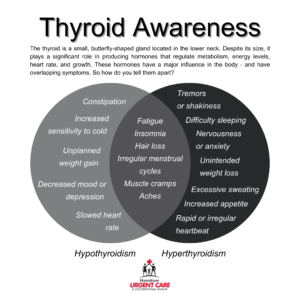What is Hypo vs Hyper.? January is Thyroid Awareness Month, something that Hometown Urgent Care & Occupational Health and the American Thyroid Association highlight to educate our communities about the importance of thyroid health. Despite the thyroid gland’s critical role in regulating bodily functions, thyroid conditions are often undiagnosed. In the United States, approximately 20 million people have some form of thyroid disease, and yet an estimated 60% remain unaware of their condition due to subtle or non-specific symptoms. To learn more about common symptoms, read below:
The Role of the Thyroid Gland
The thyroid is a small, butterfly-shaped gland located in the lower neck. Despite its size, it plays a significant role in producing hormones that regulate metabolism, energy levels, heart rate, and growth. These hormones influence nearly every cell, tissue, and organ in the body. When the thyroid gland’s hormone production is disrupted, it can lead to a variety of health conditions, including hypothyroidism and hyperthyroidism. Hypothyroidism is more common than hyperthyroidism, but the two conditions can have overlapping symptoms, such as hair loss, fatigue, insomnia, muscle cramps or aches, and irregular menstrual cycles – so how do you tell them apart?
What Is Hypothyroidism?
Hypothyroidism occurs when the thyroid gland does not produce enough thyroid hormones, leading to a slowdown in many of the body’s functions. Symptoms may include:
- Fatigue
- Slowed heart rate
- Muscle pain
- Thinning hair
- Unplanned weight gain
- Constipation
- Increased sensitivity to cold
- Decreased mood or depression
 Heavy or irregular menstrual periods or infertility
Heavy or irregular menstrual periods or infertility
This condition affects about 5% of Americans annually, with women being 8 – 9 times more likely to develop it than men. High-risk groups include individuals over 60, those with a family history of thyroid disorders, or those with autoimmune diseases such as Type 1 diabetes, lupus, or rheumatoid arthritis. Hypothyroidism is diagnosed through blood tests that measure thyroid-stimulating hormone (TSH) and other thyroid hormones (T3 and T4). Treatment typically involves a daily dose of levothyroxine, a medication that restores hormone levels. Early detection is crucial, as untreated hypothyroidism can lead to complications affecting other organs, including the heart.
What Is Hyperthyroidism?
In contrast, hyperthyroidism occurs when an overactive thyroid gland produces excessive thyroid hormones, speeding up the body’s processes. Symptoms often include:
- Rapid or irregular heartbeat
- Increased appetite
- Frequent bowel movements
- Excessive, unintended weight loss
- Nervousness or anxiety
- Tremors or shakiness
- Excessive sweating
- Increased sensitivity to heat
- Difficulty sleeping
Older adults, especially women over 60, smokers, and those with a family history of Graves’ disease are at a greater risk of hyperthyroidism and may experience overlapping symptoms that make it hard to notice. Blood tests can confirm hyperthyroidism by measuring TSH and thyroid hormone levels. Treatment options vary depending on the severity of the condition and may include anti-thyroid medications, radioactive iodine therapy, or surgery to remove part of the thyroid gland.
Maintaining Thyroid Health
Both hypothyroidism and hyperthyroidism (hypo and hyper) can significantly impact quality of life, but early diagnosis and treatment can help manage symptoms effectively. Here are some steps to maintain thyroid health:
- Regular Checkups: If you are in a high-risk group or experience symptoms, schedule a thyroid screening.
- Monitor Symptoms: Keep track of any changes in energy levels, weight, or mood that may indicate a thyroid imbalance.
- Healthy Diet: Incorporate foods rich in iodine, selenium, and zinc to support thyroid function.
- Consult a Specialist: Seek professional advice if you suspect a thyroid issue or have a family history of thyroid disorders.
Understanding the differences between hypothyroidism and hyperthyroidism is key to ensuring optimal thyroid health. Early detection can make all the difference in managing these conditions.
Stay up to date with more Hometown News and Stories.
